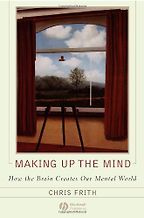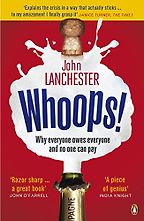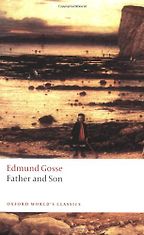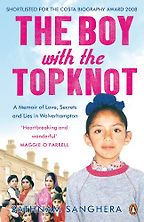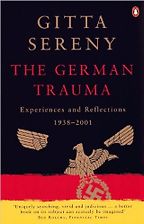Why have you decided to focus on lying?
All of the books I have chosen here are about lying, and four of them are quoted in my book Why We Lie. In psychology and in therapy we spend a lot of time saying of a client, ‘He’s in denial.’ Of course what we mean is that he’s lying to himself. That sounds rather untherapeutic doesn’t it? But we are always really writing about our clients in terms of the lies they are telling themselves. And they don’t change until they face up to the truth, to the things that they have been lying to themselves about.
Then, of course, we had Bush and Blair, and Blair being so sincere [about Iraq] when there can only have been a handful of people in the country who believed him. That set me thinking about it, about why we lie. Then along came the recent global economic crisis, which was all about lying to other people and lying to yourself: as if house prices can rise for ever. What nonsense!
This first book is by Chris Frith, Making up the Mind, How the Brain Creates our Mental World. Everything that I have written has been based on the proposition that what determines our behaviour isn’t what happens to us but how we interpret what happens to us. The basis of that is what neuroscientists have been showing over the last 20-odd years, which is that the way our brain operates means that we can’t see reality directly but only the pictures that our brain creates. Chris is an academic psychologist and emeritus professor at University College London. He wrote this not as an academic book but to help the ordinary layperson understand the way our brain works – it’s very readable, although you do have to pay attention. There are two quotes I use over and over again. Here is one: ‘Even if all our senses are intact and our brain is functioning normally, we do not have direct access to the physical world – it may feel as if we have direct access but this is an illusion.’
I had two cataract operations recently, and of course you can’t see anything. The eye they are operating on has a bright light shining into it; you only hear the voices of the surgeon and his team. During the operations, particularly the first one where I was paying really keen attention, my brain was actually just receiving random sensations but of those sensations my brain created something meaningful. On my right side I could seen rings which my brain was turning into Saturn’s rings, which I had seen in a television documentary. And on the other side, where I was seeing light shining through the blue cloth in patches, what my brain did was turn it into a framed picture of a blue sky with white fluffy clouds.
So your brain was making a pattern from random input?
Yes, and drawing on past experiences because there is nothing else it can draw on. When our brains are creating these patterns they form a whole sequence of hypotheses. And the brain goes on with these guesses until it finds one that seems to be the closest: we see this in optical illusion puzzles such as the one where a vase turns into a face and then back again.
For example, just before you arrived I thought I saw someone on the settee but it was cushions, because these new lenses, made out of plastic, are not the same as my original ones. Since the operations my brain is having to adapt to a different sort of stimuli and I keep catching it making these hypotheses.
What is appalling to me, and this is why I keep writing about it, is that so many people don’t know about this constant hypothesising – and they don’t know how to bring this knowledge to bear in their personal lives or in their professional lives.
Now if Alan Greenspan, as chairman of the Federal Reserve, had had this knowledge, had understood that everything is a hypothesis, he wouldn’t have carried out the kind of operations that he did, operations which were a very large part of what led to the economic crisis. And the same is true of the economists and mathematicians, the ‘quants’ as they call them – they wouldn’t have been so stupid as to create things like the CDOs [collateralised debt obligations] and to use them uncritically.
So there is a certain necessary humility that comes with understanding that everything is guesswork?
Yes, it is all guesswork. These people simply underestimated how little they knew. Everyone should read this book and grasp this idea. The other element everyone needs to understand is what Chris Frith writes about the self. Another of the illusions that my brain creates is my sense of myself as an island of stability in an otherwise ever-changing world. But that is not what you are: you are just a stream of impressions flowing along, with your brain trying to make some kind of sense of them. And that picture is always changing, while all the interpretations are impressions. They are all guesses and theories, and they can easily be invalidated. When you come up against a major invalidation, such as happened to Alan Greenspan when the financial system was threatened with collapse, well, you simply feel yourself falling apart. Greenspan aged terribly during that period. He looked hale and hearty when he retired but then at the hearings in Washington and when interviewed about the crisis he looked terrible – he had that beaten look people get when everything just starts to fall apart. If Greenspan had understood his limitations, he would have been able to deal with finding out that he was wrong.
What about Mark Twain’s warning?: ‘Don’t part with your illusions. When they are gone, you may still exist, but you have ceased to live.’
The problem comes when people are not able to distinguish a fantasy from a truth. We can’t live without fantasies. For example, when you were coming here today you had a detailed fantasy, which you were constantly having to revise, about how you were going to get here and in what order you were going to do what this morning – if you hadn’t drawn up that plan as a fantasy you wouldn’t have been able to carry it out.
Then there are also the comforting fantasies that we all enjoy and use. But you must remember to distinguish between fantasy and reality – I had a lot of unpleasantness from the Christians with my last book, which was on belief systems, because they were so offended when I said that religious belief was a fantasy. When I said, ‘Well, where is your evidence?’ they became offensive.
So you can’t live without fantasy because you have to plan and you have got to be able to comfort yourself: consider that very popular fantasy about ‘what I would have said had I thought of it at the time’. It’s an extraordinarily comforting fantasy. You are lying in bed and you have finally worked out what you could have said and what you would say next time – that is actually how we learn, because we practise in fantasy what we can then do. That’s how children learn through play – it’s a vital part of learning.
Perhaps all capitalism has been bubbles of illusion, but hasn’t that kept civilisation moving?
Yes, but capitalism is a relatively recent event in that way. None of this was true in the middle ages. In John Lanchester’s book Whoops!, which is my next choice, he points out that during the Cold War communism and capitalism were balanced – so capitalist America did nice things to show that they were nicer than these horrible communists. And at the time a lot of people had put their hopes in communism. I know that my dad had. Out in Australia he was told and believed that all the wrongs that he and his family had suffered would be put right and it would be a fairer world – he couldn’t believe it when the news of the Stalin trials came out. That really was terrible for him. And Lanchester says that then, after the Cold War, the Americans didn’t have that balancing effect of competition with communism. And then with a whoosh capitalism took off and along came Milton Friedman [economist and champion of free markets with minimal intervention].
The reason I’m putting Whoops! in this list, is because it’s a beautiful read and it’s so funny. But also because he says at the end of his introduction: ‘The aftermath of the crisis is going to dominate the economics and politics of our societies for at least a decade to come. It’s important that we try to understand it and begin to think about what’s next.’
Five Books interviews are expensive to produce. If you're enjoying this interview, please support us by donating a small amount.
It’s extremely readable, and a lot of it is about what I’ve been writing about from the other side – that we are incredibly bad at assessing risk. This is because we are very bad at assessing probability – every time I go into my newsagent I see people who obviously can’t afford it buying £20 worth of lottery tickets. And I tell them the odds and they say, ‘Oh well, somebody has got to win it.’ So many people are scared of flying when it is our safest form of transport – crossing the road is more dangerous here. And when it comes to our own personal life there is so much that we don’t want to see: when you look, for example, at all the failed marriages amongst your friends and your parents’ friends and you say, ‘My marriage is going to be different.’ Then there’s all the work that has been done by economists and mathematicians to eradicate risk – you cannot eradicate risk, risk is what life is.
So Whoops! is a book everyone should read. Lanchester demonstrates that out there in the real world we go on and on making these mistakes because we don’t understand ourselves. I am writing about the reasons why we don’t understand ourselves, which is because we are too scared.
Well, it is scary to think you know nothing, or even that you may know nothing.
If you understand that all you ever see or know is the constructions of your brain and that everything is a guess, then you can’t escape uncertainty. You could be wrong and that is frightening. The other part of it, therefore, is that we all live in our own world of meaning and no two people ever see anything in exactly the same way. What Chris Frith writes about, and what he and his wife Ute are now going on to research, is how, if this is the case, we manage to be able to communicate with other people. Chris and Ute are nice people and much more hopeful types, whereas I write about all our miscommunications – and there is no end of those. It is scary. You know, for example, when you are with someone who is a really good friend and then suddenly they say something and you realise there is no way of bridging your differences in how you see things. You feel so alone.
So is it better to acknowledge it, or be repeatedly horrified by these gulfs?
Some of us see ourselves as alone, but others go from ‘alone’ to ‘lonely’, which is more frightening. But not acknowledging these facts is about as sensible as refusing to acknowledge that we live in a world that contains volcanoes.
So which of our illusions are we going to smash with your next choice, which is Edmund Gosse?
I have read innumerable books over my lifetime and some I would have said in the past were wonderful. But the only book that, in my eyes, has remained wonderful is Edmund Gosse’s Father and Son. When it was first published in 1907 it was shocking because up till then no son would ever criticise his father.
With biographies and autobiographies, and this book is both, there are those that concentrate on emotion, certainly the misery memoirs – how I suffered – and others that concentrate only on events and actions – what I did. But this is great as both autobiography and biography because you see how his feelings and his thinking process were all one. He talks about realising his mother is going to die and writes that he ‘was possessed by a great anger’. Which is a wonderful description of what happens when cognition and feeling come together. The book demonstrates how children, who are not stupid, work out all sorts of things. Children are busy assessing and looking with a critical eye, even when adults are trying to keep them in the dark.
Gosse was brought up in a particular closed world, which makes it more intense, his rebellion and exposure.
He was brought up among the Plymouth Brethren. His father wanted him to become a special child, which means an especially religious child. And Edmund very dutifully did all the things he was required to do but belief never took hold. And he describes how he was experiencing this as a child. There is a passage in the book where he discovers that his parents don’t know everything, that his father doesn’t know everything.
Always a terrible moment for a child and a parent.
Yes. But Edmund has within him a companion that he can talk to, and he realises consciously that an internal dialogue is happening and that only he is on his own side.
Is that another illusion that is necessary? For children to believe their parents are infallible?
Some children find that they can’t go on to the next step, of discovering that the only person they can rely on is themselves – it is just too frightening, and so they carry on with that fantasy. And in religion, certainly the Christian religion, God is the father. So you convert your fantasy that your father is indestructible and infallible into religion – you have to recognise your own father’s fallibility but then you’ve got God. Edmund Gosse couldn’t do that. At one point he conducts a lovely little experiment where he worships a chair. His father has told him that God will strike him down. Nothing happens.
This book is by a man who realised early on that to survive in society you often need to lie to other people but you should be very judicious about the lies that you tell and to whom. But the one person you must never lie to is yourself. That is what I say all the time – no matter how unpleasant your situation, you mustn’t lie to yourself because disaster follows.
But is it not a bit like Donald Rumsfeld’s ‘unknown unknowns’, in that you don’t know what it is that you are not facing up to?
I think you know when you lie to yourself. There are lots of things that you get wrong. For example, you thought you had a wonderful friend who would always be there and then, oh dear, you got that wrong. That happens, of course. But when you lie to yourself one part of your brain is containing what we know to be true and in another part of the brain we say, ‘No, this isn’t happening.’ So we are trying to hold on to two opposing ideas. I think the brain finds this very difficult when there are two opposing ideas that the person has created. You put up a barrier between what you actually know and what you are telling yourself – the brain has got enough problems trying to make sense of the world without having to maintain these barriers. If you do that you find that you just can’t control your own behaviour – you find yourself doing things that are inexplicable.
You’ve chosen another family memoir, this one by Sathnam Sanghera.
Yes. The new title is Boy with a Topknot but it was also called If You Don’t Know Me By Now in hardback. This is just a beautifully written and, again, painfully truthful account of a life. Because Sathnam has to admit that he lived in this close-knit family and he didn’t notice that his father was really very odd. He was a grown man before he heard the world schizophrenic applied to his father. Like all children he took his mother totally for granted and it wasn’t until he started to find out about the family history that he understood – she is really a heroine, a wonderful, wonderful woman, who endured an extraordinary degree of suffering. It’s extremely moving.
At the end he has a wonderful passage about why we shouldn’t lie in our families. About how devastating it is. His point is that if in generation after generation there was something amiss in his father’s family and if each succeeding generation had not lied to one another then maybe he, the father, would have got treatment, his mother would not have suffered the violent attacks she suffered and wouldn’t have been blamed for his father’s illness. It’s actually a much more moving conclusion even than at the end of Obama’s memoir, Dreams of My Father, where he writes, again movingly, about the lies in his own family.
Many of the psychologists I have worked with over the years, we often talk about the reading list we would draw up for people training to be clinical psychologists. And this is definitely one that would be on my list, as describing the lies that are told in families and the destruction they cause. The lies live on through generations until somebody starts to tell the truth. But this was why Father and Son was such a shocking book – because Edmund was not obeying the Fifth Commandment to ‘Honour thy father and mother so that thy days be long in the land’ – ie, criticise your parents and you’re dead.
Why is it Edmund and Sathnam that blow the gaff? Is society changing so much that those taboos are fading?
Well, they are writers – they realise they have good material.
When I was starting to work on siblings for my book on that subject, I realised something from the way that perfect strangers wanted to tell me their stories about their siblings. I realised that this generation had grown up with the understanding that we can now talk about our parents and tell stories about them at dinner parties – in fact we get the story down pat. But we don’t tell stories about siblings because they are still around and they can kill us. It took me back to the days when, at the beginning, I was struggling to get clients to talk about their parents.
With Sathnam, because he is writing about a different culture, you can see how his mother would have put up with terrible suffering in order to say, ‘Well, my boy has married a good girl.’ And he would have done things in order for her to be able to say the things that balance her own suffering.
Nowadays it is still slightly dangerous to admit to family problems – people will say things like, ‘I had a perfectly happy childhood, I don’t remember much about it but I know it was perfectly happy.’ Or you will read an autobiography that begins later in life, which is always suspicious.
Your last book is history: Gitta Sereny’s The German Trauma.
This is a collection of essays that tells her wonderful story, her extraordinary story, and it gives you an idea of the sheer breadth of the work that she did on Nazi Germany and all of the people she knew and knew really well – the mass murderers who she met after the end of the Second World War, when it was becoming clear what they had done. How could they? All these cultured, educated Germans, how could they?
Get the weekly Five Books newsletter
And we learn quite a lot through Gitta about those individual Germans and how their acceptance of Hitler and their lies developed. In Why We Lie I’ve written quite a lot about those lies. Gitta’s work is so important because she keeps a record of what those people said and the lies that they told.
Lies to conceal their own complicity and to save their own skins?
And to prove, even if it’s only to Gitta, a young woman journalist, that they weren’t the terrible person that everybody says they are. From her book and the book by Robert J Lifton about the Nazi doctors, you can see that when we tell lies to ourselves we get further and further away from reality until we can no longer tell what is real and what is fantasy.
This collection covers everything that happened after the war and it is really interesting to see how Germany has changed now. When Mark Mardell left Europe to become the BBC’s North America editor, on his blog on the BBC website he said, ‘Germany is the most mature country I know.’ Now, whatever the Germans were, around Hitler they weren’t mature. But people do change, and peoples change. To appreciate the extent of this change you have to read Gitta – then you can see how they can now produce such reasonable people as Angela Merkel, with her lovely little smile and her jackets. She’s not possessed by a fantasy.
Five Books aims to keep its book recommendations and interviews up to date. If you are the interviewee and would like to update your choice of books (or even just what you say about them) please email us at [email protected]
